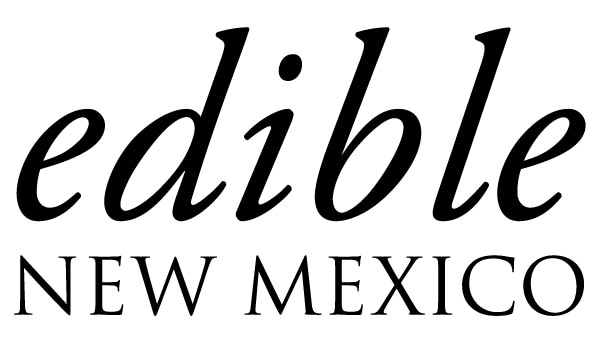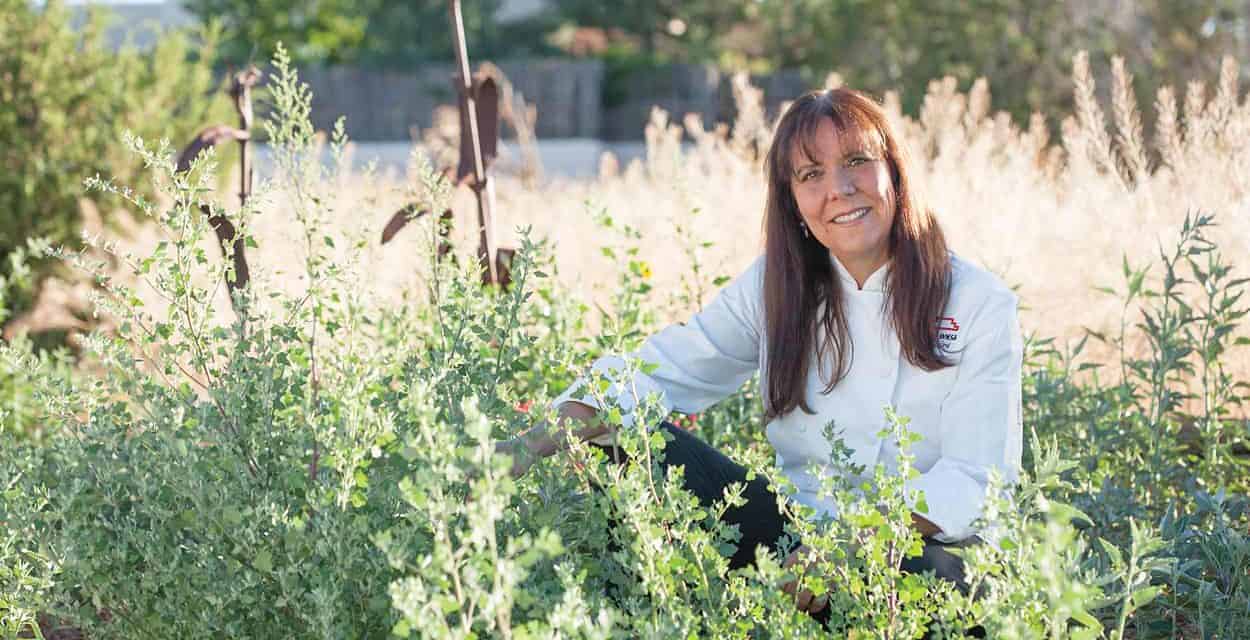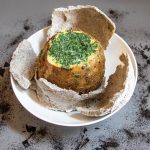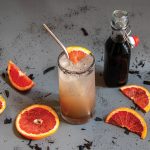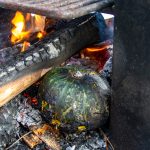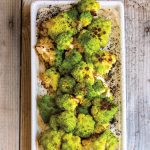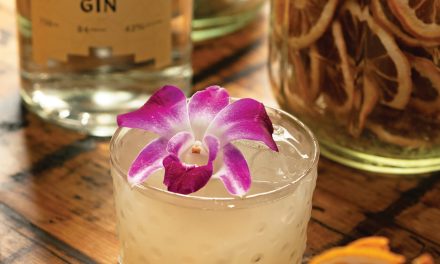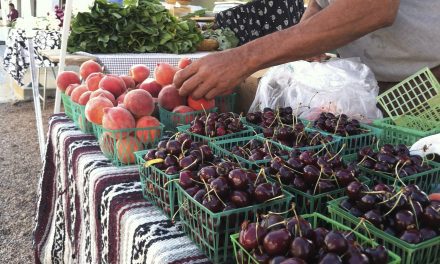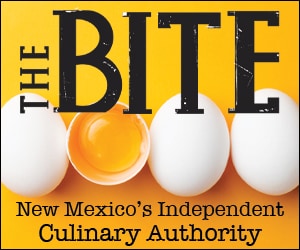Chef/Owner, Red Mesa Cuisine, LLC
Olla Award/Local Hero Award
Photo by Daphne Hougard

Lois Ellen Frank, PhD (Kiowa) is a Santa Fe–based chef, Native foods historian, culinary anthropologist, educator, and James Beard Award–winning cookbook author, photographer, and organic gardener. She is the chef/owner of Red Mesa Cuisine, a Native American catering company specializing in the revitalization of ancestral Native American cuisine with a modern twist, where she cooks with Chef Walter Whitewater (Diné). Dr. Frank has spent more than twenty-seven years documenting and working with the foods and lifeways of Native American communities in the Southwest. She works with the New Mexico Department of Health, training Native American cooks how to prepare healthy Native American meals, as well as with the Physicians Committee for Responsible Medicine on a video and recipe booklet called The Power to Heal Diabetes: Food For Life in Indian Country. She is a featured cooking instructor at the Santa Fe School of Cooking and an adjunct professor at the Institute of American Indian Arts (IAIA), where she teaches students from tribal communities all over the Americas about Indigenous concepts of Native American foods. Dr. Frank believes and teaches that “food is our medicine” and the key to future health and wellness in Native communities.
First of all, how have you been holding up during this crisis?
This has been a hard time for all of us, especially chefs as well as everyone in the restaurant business. I have had good days and bad days. I try to focus on the positive in all of this; it’s just my nature. Since the pandemic began, I have been reinventing what I do and how I do it.
I taught the second half of the spring semester for my Indigenous food class at IAIA via Zoom, and we ended the semester with a virtual Feast. My students all did a great job and we made it through a very difficult time with some wonderful Native food dishes.
I’ve also been working with Native American–owned nonprofits focused on Native American health and wellness, as well as with the New Mexico Department of Health and the Physicians Committee for Responsible Medicine, to create Zoom cooking classes and educational videos using Native American ancestral ingredients for health and wellness.
I produced a series of instructional cooking videos with easy-to-make recipes, Made in New Mexico. Everything that Made in New Mexico sells through their website and their store in Taos features local products from small mom-and-pop food businesses, highlighting all of New Mexico’s individual flavor and distinctive native ingredients. I also created some virtual cooking classes with the Santa Fe School of Cooking.
We have to keep going. We have to keep alive the ancestral foods and the health benefits they provide, especially during a time of crisis like this. We have to carry on the message that food is our medicine.
There has definitely been a learning curve on all of this, but it has been a fun challenge and I am starting to get the hang of the new technology that we have been launched into. I started my own YouTube channel and am in the process of uploading the videos we have been producing. I am also working on putting these videos on my website with other information, including the research on specific Native food ingredients that my students at IAIA completed for their final research topics this semester so that other educators can use their PowerPoint presentations.
How has the pandemic affected your work so far? Going forward, what do you hope you can learn from this experience, as it pertains to our local food practices? Have there been any silver linings?
It’s still playing out, [so] I won’t know the true answer to this question until things evolve. As of right now, most of the events on the calendar have either been cancelled or postponed until the fall or moved to 2021. We are starting to get calls for small groups now, and we are working on estimates for those events for the future.
I can’t wait to get back to work and cook for events. That’s what I do. I create memories. I share stories. I create experiences that go along with the delicious food that I prepare with the people I work with. It’s not uncommon for Chef Walter and I to bring the hand drum and end the dinner, or the luncheon, or the special event that we cook for, with a traditional Native song. We nurture the body, but we also feed the soul.
A lot of what I do is experiential. It’s about talking to and educating the group, it’s about feeding the group, and explaining to them about the farmer or harvester who supplied us with the ingredients that we used and that are now a part of the dish we are serving.
For me, it’s bringing to the table the “scapes” of the area, which include the landscape, the soundscape, the smellscape, and the foodscape. I suppose some might use the French word terroir to describe the flavor developed from environmental factors affecting a specific food or wine, but I think the only way to truly experience a place—like where I cook, here in northern New Mexico—is to experience all of the scapes.
So I’m looking forward to doing all of that again. I’m looking forward to serving up experiential knowledge surrounding the ancestral foods that I cook with and creating a unique culinary experience that comes from all of the components of a meal. The land, the food, the farmers that grow the food, the wild harvesters who harvest for me, the chefs that help me prepare the food, the servers who serve the food, and the song that we sing at the end of the meal.
Throughout this pandemic, I have been working with Chef Walter to create educational videos on a variety of local dishes, using local ingredients, which are both nutritious and delicious. After each episode and/or video, I package the leftover food into to-go containers, and feed some of my elderly neighbors. My neighbors range in age but some of them live alone. I put the food in their mailbox and text them when it is there, so that they don’t have to have face-to-face contact and I do not put them at risk in any way.
This way they are nourished with wholesome, local, organic, delicious, healthy food and I have zero waste. It’s been a win-win situation for all involved and I think after this is all over, I will continue to feed my neighbors. It brings us closer. It creates community. I get a lot of texts from them now, about how much they have enjoyed the food that I have provided to them. It’s heartwarming. This experience has helped me to appreciate everything I do more than I did before.
Is there anything else you’d like to share with edible readers?
I just want to say that receiving the Olla Award is a great honor for me. And I want to thank everyone that voted and supported me. I feel not only honored, but also very blessed to be one of the individuals recognized for my work to create healthy, innovative, vibrant, delicious and nutritious food, but also to be a part of such a resilient local sustainable food system in New Mexico. Thank you to everyone that I work with, from the farms and growers, food producers, wild food harvesters, food purveyors, chefs, servers, dishwashers, to every client, nonprofit, educational institution, community, tribe, and organization I have ever cooked for. I am grateful to all of you.
Edible celebrates New Mexico's food culture, season by season. We believe that knowing where our food comes from is a powerful thing. With our high-quality, aesthetically pleasing and informative publication, we inspire readers to support and celebrate the growers, producers, chefs, beverage and food artisans, and other food professionals in our community.
